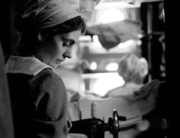
No doubt, filmgoers have heard by now that Martin Scorsese’s new film reunites the director with Robert De Niro and Joe Pesci, as well as pairing him for the first time with Al Pacino. At a cost of a reported $160 million, The Irishman arrived at the New York Film Festival last Friday for its world premiere with the epic length of 209 minutes.
After a brief, three-week run in theaters, it will stream on Netflix, which is an appropriate platform for this sprawling crime film, where viewers can watch the film in chapter bites, although not without breaking the narrative flow. Because one thing’s for sure, Scorsese sweeps the viewer along, abetted by Thelma Schoonmaker’s razor-sharp, machine-gun-style editing. Even in one continuous sitting, the movie doesn’t feel like its more than three hours long.
Although it takes place over five decades, 1949–2000, with many historical milestones occurring in the background, the film is more intimate than epic. Based on the 2004 nonfiction book by Charles Brandt, I Heard You Paint Houses: Frank “The Irishman” Sheeran and Closing the Case on Jimmy Hoffa, it centers on Frank Sheeran (De Niro), a veteran and a postwar yes man. With an even-keeled temperament, he works his way up from truck driver to hit man, gaining the trust of the Philadelphia-based mob boss Russell Bufalino (Pesci), who runs a textile business as his cover.
The script implies that Sheeran has an urge to free himself, if not of his guilt, then to at least explain himself, which accounts for the film’s framing device of the older hit man sitting in a nursing home talking to no one in particular while spilling his guts out. He centers his recollections on a three-day mid-’70s road trip to Detroit with Russell and their wives for a wedding, and to meet up with James (“Jimmy”) Riddle Hoffa (Pacino), president of the International Brotherhood of Teamsters, then two million members strong.
As the movie opens, De Niro is buried under old man makeup with a bald cap and glasses, and appears less convincing than in the rest of the film, in which he subtly ages from his 30s to his 80s. The aging process is noticeable but not distracting; it is not as though the digital effects by the production house Industrial Light & Magic were put to use for cosmetic reasons. Yet one has to wonder if that’s one reason why the actor comes across as placid and with limited expression. Or, it could also be the role. The plot rotates around an ordinary Joe with limited self-awareness.
In time, Sheeran becomes a trusted confident of Hoffa, whose presidency has been supported greatly by the East Coast mob. According to Sheehan, the Eastern crime syndicates helped Kennedy win Illinois to clinch the 1960 presidency. He also claims to have delivered weapons to South Florida for the Bay of Pigs mission. As Sheeran admiringly put it, “All roads lead back to Russ,” though it’s safe to say that he’s embroidering his yarn when he proclaims Hoffa is bigger than Elvis.
In the early 1960s, both Hoffa and the mob have a common enemy, the federal government: Attorney General Robert F. Kennedy’s crusade against labor corruption and organized crime. In 1964, Hoffa is convicted of jury tampering, bribery, and fraud. After serving five years in prison, Hoffa is pardoned by President Nixon in 1971. In return, he’s banned from engaging in union activities, but Hoffa retains a tight grip on the Teamsters’ pension fund, thwarting mob control.
Sheehan’s flip, casual voice-over is much in the same jaunty vein as the narration in Scorsese’s Goodfellas and Casino, although its light manner is darkened by the edits that contradict Sheehan’s version that he spoon feeds the audience. As IndieWire’s Eric Kohn said, the film is “like a greatest hits album from a master of the medium.” The tone varies largely due to the nonstop soundtrack of mostly pre-Beatles, top 40 hits, heavy with Mambo and doo-wop, and then there are Scorsese’s long, roaming tracking shots.
Among the large ensemble, the title of most valuable player goes to, with some argument, the showboating Pacino, who keeps the narrative juices flowing. He has the best part, mainly because Hoffa has the most at stake: his reputation and his ego, which are pretty much one and the same. But Hoffa also has the most fun, pontificating, correcting the boorish manners of goons, devouring an ice cream sundae, and railing against others, especially the Kennedys. (Fortunately, the screenplay doesn’t delve into a conspiracy theory insinuated by one of Hoffa’s boasts: that he had dropped off the weapons for the Kennedy assassination.)
However, given that Pacino has built his career on “The Godfather” saga and Scarface, it’s a bit of a stretch for his Hoffa, though in real life a teetotaler German/Anglo Midwesterner, to be described as an outsider. That the union leader is not Italian becomes a major plot point as negotiations between Hoffa and his former allies go south.
In contrast to Pacino, Pesci gives one of the subtlest, and calmest, performances of his career as a quiet mob chief. His most memorable moments are dialogue-free. Sheeran’s right: Russell holds all the cards, and in Pesci’s interpretation, he has confidence in his power; he doesn’t need to give commands when a slightly raised eyebrow will do.
Pacino doesn’t quite commit grand larceny in grabbing and holding onto the spotlight for dear life, it’s just that De Niro’s Sheeran is a company man through and through, an observer and follower. He’s not so much a man of action but one who obeys. We’ve seen this type before, the mid-20th century male who stifles his feelings, incapable of expressing himself: the blood-splattered man in the gray flannel suit. His motivations are clear regarding his line of work: “Like the army, you follow orders,” and his expression and demeanor remain calm and differential.
Few female characters are allowed into this swaggering boy’s club. One possibly intriguing story line involves Sheeran breaking up his first marriage to marry his girlfriend. However, both women are interchangeable, given very little to do, although Russell’s wife, Carrie (Kathrine Narducci), at least stands out for chain-smoking cigarettes. Anna Paquin plays Sheeran’s favorite daughter, Peggy, who shies away from her father’s colleagues, except for uncle Jimmy. Peggy, too, is given—and gives to her father—the silent treatment, expressing herself through actions, minimal dialogue, and screen time.
Late in Frank’s life, a priest asks him if he feels anything about what he has done in his life. Frank answers, less than penitently, “No,” and based on De Niro’s performance, the audience unquestionably believes him. Although Sheeran haltingly reaches out to Peggy, who has cut herself off from her father, he doesn’t come clean or barely tries to. That’s among the reasons why Sheehan and his cohorts feel small scale, besides their clear-cut motivations. They are easily upstaged by the filmmaking. Though this is a lucidly told and often engrossing labyrinth of a tale, it’s also a bit hollow at its center.
















Very good review . Glad you don’t drink the Scorsese gangster movie kool aid about this boring bloated pretentious film . St.Marty thinks this is the first time a gangster film had paid attention to what a life of crime and regret and mortality does to us all.
Martin Scorsese is a great director. For over 40 years, man has been engaged in real art. Martin was planning to shoot this film for a long time, the first news is dated, it seems, in 2004. Was it worth the wait? Definitely. In many respects the merit of the fact that the film is very nice to watch is – soundtrack. As usual, Scorsese’s soundtrack is perfectly matched, perfectly conveying the atmosphere of eras. The Irishman is a epochal film. This is the last work of Martin Scorsese, and perhaps the last time we see Joe Pesci, Robert De Niro and Al Pacino on one screen. Thanks for your review. It was interesting to read it!